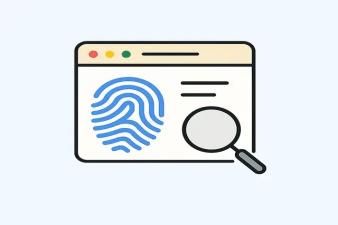What is Browser Fingerprinting and How to Clear It?


In today’s digital age, protecting your online privacy is more important than ever. You may have heard of “browser fingerprinting”, but what exactly is it? Why can websites track you even if you delete cookies or use incognito mode? This article explains browser fingerprinting, how it works, and practical ways to clear or protect against it, helping you browse safely and privately.

What is Browser Fingerprinting?
Browser fingerprinting is a technique that uniquely identifies users by collecting information about their browser and device. Unlike traditional cookies, fingerprints don’t rely on stored files—they are generated using data points such as:
- Screen resolution and device pixel ratio
- Timezone, language, and system theme
- HTTP headers
- Operating system and version (Windows, macOS, Linux, etc.)
- Canvas and WebGL rendering details
This combination of data can almost uniquely identify your device, even if you clear cookies or use private browsing.
Why Is Browser Fingerprinting Tracked?
Browser fingerprinting is mainly used by advertising companies, analytics tools, and certain data platforms to track user behavior. Through fingerprinting, your browsing history, visiting habits, interests, and more can be analyzed and recorded. Compared to cookies, browser fingerprints are more discreet and much harder for the average user to detect.
二、How to Remove or Protect Against Browser Fingerprinting
While it’s almost impossible to completely hide or delete your browser fingerprint, you can take several measures to reduce the risk of being tracked:
1.Use an Anti-Detection Browser
Specialized browsers, such as MostLogin Anti-Detection Browser, can simulate different devices and browser environments, blocking most fingerprint characteristics and reducing the likelihood of being identified.
Key Features of MostLogin Anti-Detection Browser:
1.1 Multi-Account Management
Easily manage multiple accounts within isolated browser environments, ensuring each account’s cookies, digital fingerprints, and session data remain fully independent.
1.2 Team Collaboration
Leverage a fine-grained permission management system to securely and efficiently share browser windows among team members.
1.3 Extension Integration
Install Chrome extensions in bulk with one click for all windows, fully compatible with the Chrome Web Store and any compliant custom extensions.
1.4 Automation
Automate tasks such as form filling, page navigation, and data collection through custom scripts, improving efficiency while keeping your data secure.
2.Regularly Clear Browser Data
Although browser fingerprinting does not rely on cookies, regularly clearing certain data can still help reduce tracking risks:
- Browser cache
- Browsing and download history
- Local storage (LocalStorage / SessionStorage)
3.Install Privacy Protection Extensions
Privacy extensions can restrict access to JavaScript, Canvas, and WebGL data, thereby minimizing fingerprint data leakage. Examples include:
- Privacy Badger – Automatically blocks trackers
- uBlock Origin – Blocks ads and tracking scripts
- Canvas Defender – Spoofs Canvas fingerprints
三、Conclusion
Browser fingerprinting is a powerful tracking technology that’s hard to completely neutralize. However, by using MostLogin Anti-Detection Browser, installing privacy extensions, and optimizing device characteristics, you can significantly lower your tracking risk.
In today’s fast-paced digital world, if you want to operate more safely when doing cross-border business or using overseas social platforms, MostLogin Anti-Detection Browser is your go-to choice. It helps you hide your device characteristics from the ground up, allowing you to browse websites safely and efficiently.
🚀 Best Anti-Detection Browser-MostLogin
MostLogin helps users tackle multi-account management, environment isolation, and account risk control.
For any questions, please refer to Official help documentation


